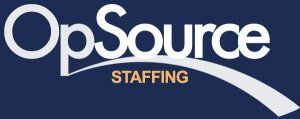Job-seekers and Employers, if you would like to discuss how OpSource Staffing Inc. can help you call us at (866) 870-8133 or Contact Us.
For many, the last few months have been an exercise in patience, especially regarding career
progress. So much has been placed on hold, stalled and canceled, that it can be tough to find traction and forward movement to reach your goals. Rather than let COVID-related delays get you down, use this time to invest in the one thing that will impact your career
the most: yourself.
Here are five easy ways to make the one investment you’ll never regret:
1. Get clarity and alignment on your goals
What do you want? It’s the first question to ask yourself because having clarity and specificity around your goals is essential to devising a plan to achieve them.
The best way to gain clarity is to slow down and reflect on what you want most. This can be surprisingly difficult, especially if you’ve wrestled with fear and insecurities about acknowledging your dreams or if you’ve never pushed the pause button on your busy life long enough to give yourself the space to do so.
Once you’re clear, you need to align your goals with an environment that supports them and helps you stay away from the things that can derail you. This starts with understanding how you’re spending your time and where and with whom you’re investing your attention. Ask yourself if this choice helps you move closer to your goals or prevents you from achieving them.
If the people in your world are holding you back from accomplishing what you need to do, let them go and find a new inner circle of those with positive energy who support your goals.
2. Dedicate time to reading
According to a Pew Research Center survey conducted last year, 27 percent of U.S. adults say they haven’t read a book in whole or in part in the past year. Contrast that with leaders like Bill Gates, who reads 50 books a year or Mark Cuban, who reads three hours a day.
Research suggests reading has numerous benefits. Readers build their intellectual capacity to reason and solve problems, have better people skills, and possess a broader perspective, allowing them to envision multiple possibilities. Reading is also one of the quickest ways to acquire and assimilate new information and grants you access to insights outside your area of expertise, which can fuel creativity and innovation.
3. Learn to say no
Always saying yes can leave you exhausted, stressed, and time-poor, wondering why you’ve been busy but not productive.
Billionaire Warren Buffett, the chairman and CEO of Berkshire Hathaway, believes that “the difference between successful people and really successful people is that really successful people say no to almost everything.”
Notice that Buffett said almost everything. What he is speaking to is our ability to master decision-making and time management. He says we must choose, with intention, how to spend our time and then set boundaries to protect it. Since time is a limited and non-renewable resource, invest yours wisely by prioritizing and focusing your attention on what matters most.
4. Say yes to growth opportunities
Saying yes isn’t always bad. It invites collaboration and empowers and affirms others, and more importantly, can help you grow.
If you wait until you feel ready to pursue an opportunity, chances are it’ll pass you by. Saying yes means that you’re open to moving past your comfort zone and embracing a new challenge. By saying yes, you naturally adopt a growth mindset, leading with your curiosity.
Saying yes also creates an environment where it’s safe to try, fail, learn, and innovate. When you freely say yes, you become more risk-tolerant and encourage innovation by trying new things and using the successes and failures as learning opportunities.
5. Prioritize your well being
Living in a world of “always on” culture can wreak havoc on your well being. You can’t pour from an empty cup. If you’re having frequent headaches, are sick and tired (again), or unmotivated, those are all red flags that you need to take a break.
Encourage restorative slumber by maintaining a reasonable and consistent bedtime, limiting screen time, leaving your phone outside your bedroom, and keeping your bedroom’s temperature cool.
Nourish your body with proper nutrition and movement. Recharge your spirit through meditation, prayer, and reflection, by spending time in nature, and by visiting with friends and loved ones.
Learn to calm your nervous system when you’re upset by breathing deeply and putting your hand on your heart, which releases oxytocin, a hormone that makes us feel safe and connected.
Employ self-compassion, treating yourself the way you would a treasured friend, by swapping self-criticism for supportive self-talk. Remember, the stories you tell yourself are the most important words you speak. Words have power, so choose them wisely, and maintain a growth mindset to encourage progress.
Article Provided By: Forbes
Related Posts

Advantages: 1. Strategically balance labor needs and production levels by bringing in workers when they need them and then letting them go when they do not. 2. Convert a historically fixed labor cost to a variable one while shifting liabilities for unemployment, EEOC matters, benefits, and worker's compensation to a third party. 3. Use of contracted suppliers to manage low-skilled tasks leads to better outcomes at a lower cost. 4. Purchasing and finance departments save money on what companies pay for the hourly bill rate. Disadvantages: 1. Large disparity in pay between full-time regular employees and temps gives rise to a wide gap in the quality and dedication levels between the two types of workers. 2. Temporary workers display lower morale, higher absenteeism, greater turnover, less efficiency, and poorer work quality as compared to their full-time counterparts. 3. Decreased business efficiency as more labor hours are required to get the same amount of work done, largely due to exorbitant turnover and absenteeism, as well as constant restraining.

Career growth may seem like a controversial topic right now. Can you really have career growth in the middle of a global pandemic? Some people might roll their eyes at the thought or brush it off because it seems impossible. But what if it’s not? Whether you’ve been tossed into an unexpected job search or you’re secretly on the hunt for a new job, career growth should be your top priority. If you don’t make it a priority, you risk becoming stagnant, or worse, taking a step back in your career when it might not be necessary. But, even if it is a priority, you might not be taking it as seriously as you think. Here are five subtle signs you might be holding yourself back from career growth. You’re on cruise control or panic mode. This global pandemic has thrown tons of people into cruise control or panic mode. If you’re on cruise control, you’re probably telling yourself that now is not the time to make any sudden moves. Even though you’ve wanted to change jobs for a while now, you’ve likely convinced yourself that it’s best to keep your head down at work until the coast is clear. If you’re in panic mode, then you’re likely not thinking strategically about the next step in your career . You might be feeling like you have to take whatever you can get, without evaluating what you want or the various ways you can contribute to the next company. Both cruise control and panic mode are harmful to your career growth. Cruise control might feel safer, but it’s keeping you stagnant. Operating in panic mode might be stopping you from seeing all the ways you could successfully pivot your career and could have you taking detours you might not have to take. You’re not sure what career growth you want. Career growth looks different for everyone, especially right now. Career growth could mean more mentorship, more money, more leadership opportunities, more training and development, more impact, new challenges, a new industry, a better work environment, the list goes on and on. You may not want all of those things at once. You may not be able to get every single one of those things right now. But, it’s important to recognize which of those things are most important for your personal career growth so that you can at least try to aim for them. It’s like when you decide you want a specific car and all of a sudden you start seeing that car everywhere you go. But, if you never decided, you would’ve never noticed it passing you by. It’s the same way with career growth, if you don’t know what you want, you won’t have a clear focus moving forward and you’ll likely end up settling because you didn’t know what to pay attention to or ask for in your job search . You’re dwelling on the wrong things. It’s too easy to think negatively right now. But when it comes to your career growth, especially landing a new job that moves your career forward, thinking negative is 100% guaranteed to keep you stuck and stagnant regardless of how nice it would be to land a new job you’ll love. If you’re constantly asking yourself, “What if I don’t get it?” instead of, “How can I increase my chances of getting it?” then you’re spending too much energy entertaining negative possibilities when you could be welcoming positive ones. Instead of dwelling on the wrong thoughts and soaking up all the negative news, start paying attention to the things that are going right. Scroll down your LinkedIn feed and soak up the success stories of people celebrating accomplishments and starting new jobs right now, even if they are few and far between. Decide that it’s possible for you too. Attaining career growth is not just about doing the right things but thinking the right thoughts as well. You’re relying on motivation. No matter how well our intentions are, motivation is like that flaky friend who says they’re going to show up to the party but rarely ever does. When you’re worried about still meeting your deadlines, not catching coronavirus and landing a new job, you need something stronger than motivation if you want to make career growth a priority. You need a plan. When you have a clear and strategic plan on how to land a new job that will offer you the career growth you want, you can rely on discipline and consistency rather than motivation. You’re not strategic about getting support. You hear people say all the time, “network, network, network!” But, reaching out to strangers on LinkedIn expecting world-class advice and top-notch referrals without even building a genuine relationship or having a real conversation is not the way to go. Connecting with other professionals, and getting support from experts or career coaches, when done the right way, can be a catalyst for success. But if you have no clue how to do that, if you’re mass emailing people without any thoughtfulness, if you think getting support from a career coach is a luxury and not a necessity when you know you need guidance, then you’re not taking your career growth seriously and you should consider changing your approach. It is still completely possible to land a new job that moves your career forward, even right now. But it starts with you. If you know you’re guilty of one of these five things, that is good news! That means there is plenty of room for improvement and that you still have the power to move your career in a more satisfying direction. Article Provided By: Forbes

As of May 2020, the Bureau of Labor Statistics reported the current U.S. unemployment rate as 13.3%. While slightly down from April, unemployment is the highest it’s been since the 1930s. For many working Americans, this is the first— and hopefully last — time that we have seen anything like this. With millions of Americans now looking for work, employers need to rapidly adjust their workplace policies to remain competitive with top candidates. How Workplaces Have Changed In just a few months, the face of the American workplace has changed dramatically. March saw employees divided into groups labeled “essential” and “nonessential,” while stay-at-home orders forced teams to adapt to remote work. While some are returning to offices, job sites and other places of work, many employers are planning to permanently close some, if not all, physical locations. On May 12, Twitter made headlines as CEO Jack Dorsey announced that employees could work from home forever. This is just one of many companies reframing its view of the modern workplace. For those of us who have returned to our offices, we are met with sanitation stations, increased distance between desks, masks and other public health safety measures. Meetings are either stand-up only, with people practicing social distancing, or held virtually. What’s On The Horizon Some companies struggling with precisely how to adapt their current environment to new social distancing standards are considering adding staggered shifts to maximize space usage. In this scenario, multiple employees could share a single workspace but on alternating days, with a strict cleaning regiment in between. Along with creating a healthier environment (fewer people in close quarters), flexible schedules can allow for a reduction in office square footage. Businesses nearing the end of their lease can use this as an opportunity to downscale their office footprint and add to the bottom line. Many office space designers are considering how the change will impact future plans. For years, open office environments have been the trend. Cubicles have been replaced with standing desks, portable partitions and lots of room to roam. While closed offices and cubicles likely won’t return, it’s possible office buildings could transform from daily use facilities to places where meetings and conferences take place. National organizations may also begin opening regional hubs to provide coworking spaces for remote employees to use sporadically instead of congregating regularly in one central location. How Employers Need To Approach Hiring 1. Advertising And Follow-Through Once your team has reviewed which positions will be mission-critical for the remainder of 2020, actively advertise these jobs . A small investment combined with regular candidate follow-through will help eliminate concerns some job seekers have about the longevity of a new position. The first few emails and calls to a candidate help to set the stage for the relationship and establish your company’s culture in their mind. 2. Be Mindful Of Social Media How your organization is responding to the pandemic says a lot about your company’s culture and leadership. Candidates interested in working for your business are often actively following your posts, and their decision to join may be swayed by this content. Work with your social media manager to ensure posts come from a position of strength and positivity. 3. ‘What Have You Been Doing During This Time?’ While it may seem like an unusual question for an interview, the answer can tell volumes about the candidate’s work ethic and how serious they are about advancing their career . Many candidates are using this time to expand their knowledge and boost their skills. As you begin accepting résumés, keep an eye out for any new certifications awarded in 2020. Applicants who have invested in themselves may be a better long-term fit. 4. Establishing A Work-From-Anywhere Policy What once was a perk, the work-from-anywhere (WFA) concept may soon become the standard, and job seekers might consider it a necessity. Businesses that have put solid technology in place with clear WFA policies will likely be in a better position to attract top talent. Fairly soon, competition for candidates will become fierce. A recent Gallup survey found that 54% of office-based professionals would leave their job for one that offered flexible schedules and remote work opportunities. If you haven’t already made WFA part of your long-term business plans, you should consider doing so. 5. A Clear Public Health Plan A question bound to come up during an interview is how your company is helping to keep employees safe. While much of this article has focused on office-based professions, many of Ameri-Force’s employees work in the skilled trades, primarily in our nation’s shipyards. Most of the worksites have implemented rigorous health protocols, including daily temperature checks of all employees, frequent sanitation stations throughout the worksite, staggered shifts to increase social distancing and daily deep cleaning of surfaces. Make sure you’re relaying the steps you’re taking to candidates applying for job openings. 6. Act Quickly With millions of highly skilled Americans actively seeking work, now is the time to attract and retain the best talent. However, don’t wait too long to begin the hiring process. As states have begun to reopen, jobs are being added, and people are getting back to work. If you wait too long to hire, you may miss out on promising candidates who could have made a significant impact on your company. If you’re considering bringing on additional staff, now is the time. Article Provided By: Forbes






